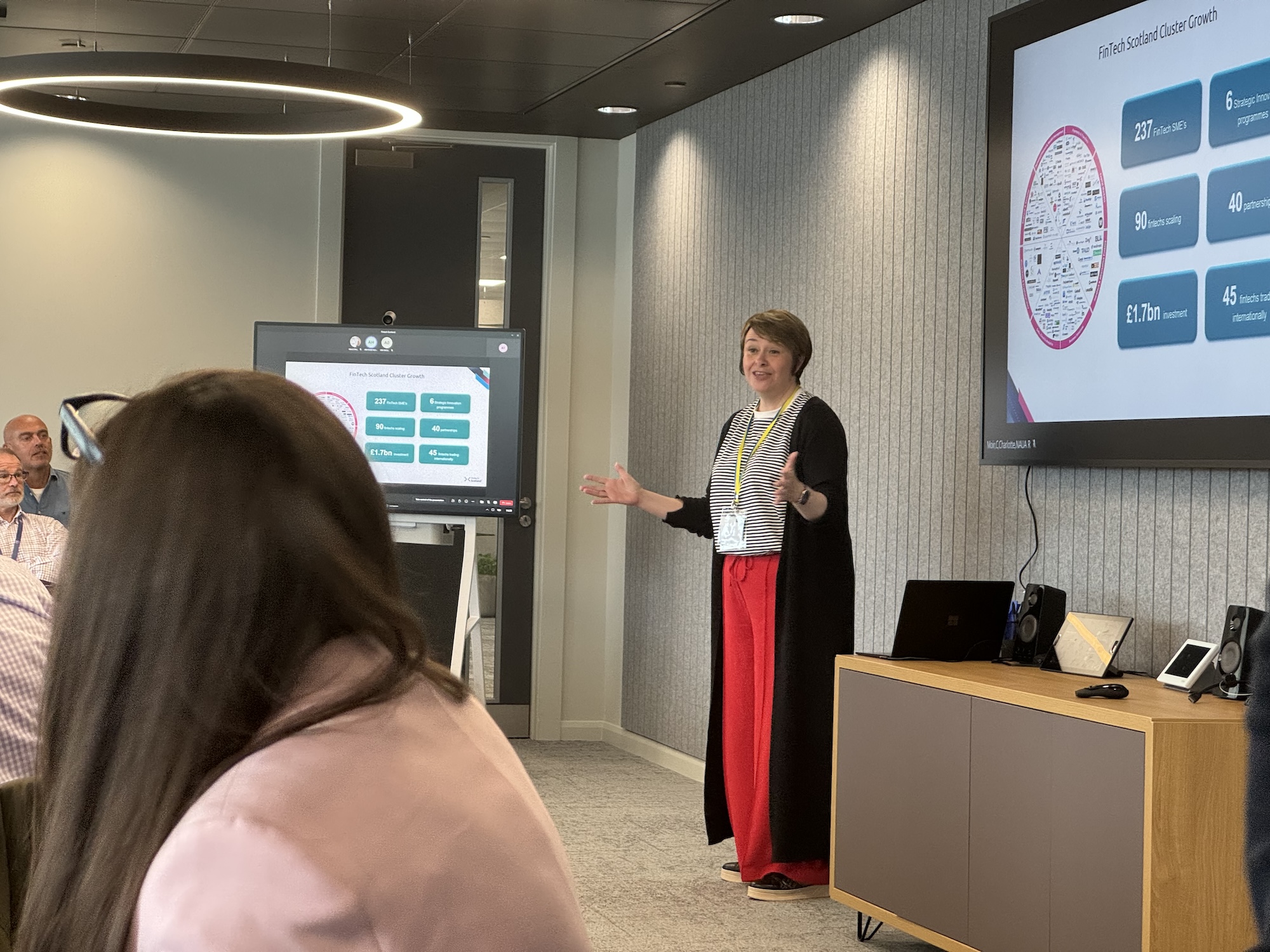Financial Focus: Nicola Anderson on the rise of Scotland’s fintech sector

Nicola Anderson
The statistics in Scotland’s fintech sector are impressive. The industry has only realised its significant potential since the 2010s with the advent of mobile technology, cloud computing and the big data revolution – but is now a part of our lives through daily engagement with open banking, digital-only banking and e-commerce platforms.
Scotland – and the wider UK – has been quick to realise the potential both here and globally for the technology, says Nicola Anderson, CEO at FinTech Scotland. There are now 247 fintechs in the country, with 10 universities proposing fintech courses, 76 international fintechs having made Scotland their new home and 22% of the fintechs here trading internationally.
FinTech Scotland, which supports fintechs throughout the country, organised its seventh festival in September and Anderson says the focus this year was very much around its ten-year Research and Innovation (R&I) Roadmap aimed at boosting economic recovery, driving growth and creating jobs while highlighting themes such as financial inclusion, net zero and financial well-being.
“What we found was that the breadth of engagement was significant, from innovators to academics and industry, both financial services and tech, as well as investors and from the international community where Scotland increasingly has an important voice”, Anderson says.
“This gives us real confidence that the roadmap that we are guided by is a useful tool – a connecting point for the industry and even and more importantly, a forward looking, progressive, action-orientated, way forward.”
Crucially she says, these results have included ongoing collaboration with other UK regions around themes that include climate finance. Using the Financial Regulation Innovation Lab (FRIL), based out of Glasgow, FinTech Scotland and SuperTech West Midlands are collaborating to tackle the climate emergency through tech-driven insights and research.
FinTech Scotland, she adds, is also committed to supporting the growth of SMEs to drive economic growth and job creation for Scotland.
A collaborative approach to collectively drive opportunities in the sector is clearly central to its strategy she says. “It’s standing us in great stead, and we’re actively involved with all the other regions across the UK.”
In the financial sector it’s important that technology thinks about the future of risk management and the future of supervisory oversight and though quite costly, regulation, compliance and risk functions within an organisation are vital. They continue to present challenges in a relatively new, disruptive sector.

It’s an area in which Anderson has considerable experience as, prior to joining FinTech Scotland, she was a senior leader at the FCA (Financial Conduct Authority), where she worked as part of the retail banking supervision senior leadership team.
In any emerging sector there will inevitably be challenges. For example, Starling Bank, the digital app-based start-up founded by RBS and Allied Irish Banks alumnus Anne Boden, generated its first profit in 2022.
The challenger bank, however, was fined almost £29 million by the FCA this year for failings related to its financial sanctions screening and also this year it was reported that Revolut had been issued more fraud views (initial judgements which can be appealed) than any other provider.
But well-known legacy banks are actively engaging with the Scottish fintech cluster which has attracted partners that include Lloyds, Barclays, HSBC, J.P. Morgan and Morgan Stanley as well as Baillie Gifford, M&G and Royal London as well as accounting majors and academic institutions.
Engagement between these big institutions and the country’s innovative fintech SMEs is one of FinTech Scotland’s primary objectives. “We have a significant fintech community, and it’s important that we understand and help it grow thanks to a deep understanding of what support a fintech needs to grow and scale here,” says Anderson.
“There’s a focus on the capabilities that those businesses are building and how they will help the broader financial services sector in the UK and the world think about how they adopt financial technology as part of their ways of working.
“We can support that transition and bring much more insight and depth of understanding to sector challenges. It’s through that type of cluster-led approach that we’re seeing the momentum build.”
She adds that the growing emphasis on the climate emergency is one that affects the fintech community as much as any other sector of industry. “There is concern about carbon markets – but also a broader take on financial instruments regarding the way in which we think about the net zero agenda.
“The term ‘climate finance’ allows us to have this broad conversation with innovation in ESG data presenting a much broader opportunity for society – and indeed for the financial services sector,” she says.
Fintechs are offering solutions across various sectors. Among them Anderson cites Amiqus, the compliance and onboarding platform and the 34th fastest growing fintech in the UK, supporting more than 500 organisations across different areas of business.
“This is a shining example of a Scottish fintech business with real purpose and drive, and one growing with a good growth trajectory. Its focus is on making sure people get access to the right financial services, products that they need, and indeed, legal services,” she says.
She also mentions AI fintech solutions company Aveni plus Bridge, the payments orchestration service and Snugg, which has created an easy-to-use online platform for researching and improving a home’s efficiency as companies that are all focused on ensuring that customers get maximised financial outcomes, which is vital in the current climate.
The majority of fintech businesses now in Scotland, she says, are building a business to business (B2B) or a B2B to C (consumer) proposition which she believes is “very helpful in several ways, as we transition to a technology enabled financial sector – so it’s important that the existing industry works alongside the innovators to help with that.
“There’s always the knowledge that change is inevitable, but progress takes effort – and we will only achieve that progress through a collaborative approach.”











